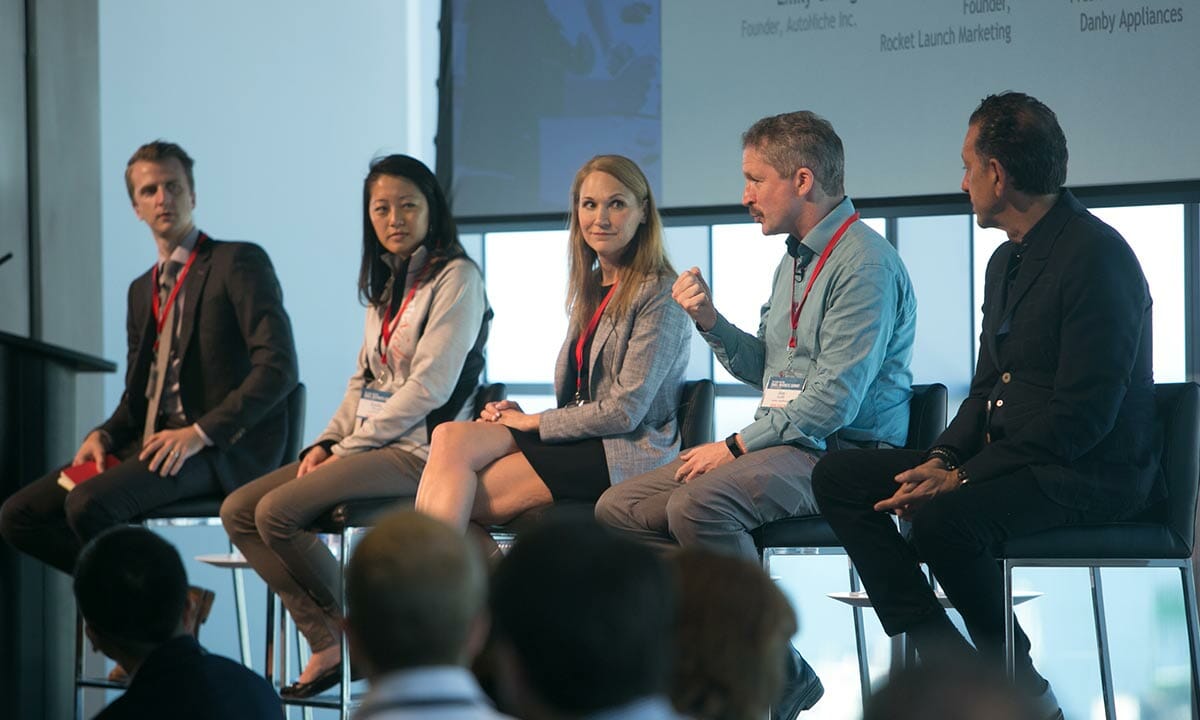Some of the country’s leading entrepreneurs gathered May 8 for The Globe and Mail Small Business Summit in Toronto. Panels and talks focused on a range of business issues, from recruiting talent to expanding to the United States. Here are five key take-aways.
1. You Need True Grit
Entrepreneurs rarely tell you about the times they wondered whether they would be able to make a go of their venture, says April Dunford, founder of Rocket Launch Marketing. “It doesn’t make for a very good story when you say, ‘Everyone was fighting and we had to fire the founder,'” she says. “So we just tell the last bit where we came up with a good idea and it rocketed to the moon and we all made a billion dollars.”
But every successful business has multiple “everything-looks-terrible moments,” she says. “You have to persevere. The best entrepreneurs just push through it.”
2. Want to Know Your True Value? Listen to Your Customers
Nine years ago, when Emily Chung founded auto repair shop AutoNiche Inc. in Markham, Ont., she had a clear vision of the customers she wanted to attract. Ms. Chung was initially inspired to become a mechanic and start a shop because, as a woman, she felt taken advantage of by mechanics. So she focused her initial marketing efforts on conveying that hers was a “woman-friendly repair shop.”
The problem: She quickly realized about 85 per cent of her clients were men. “We started asking them why they chose us,” she says. Her findings? Men tend to be assigned the task of bringing the car in for repair. Yet they often know little about the mechanics of a vehicle. They liked the idea of taking their cars to a “comfortable place” where they wouldn’t be bombarded with technical jargon. In response to that feedback, Ms. Chung respun her marketing strategy to promote the idea that her shop was family-friendly. “It was a good lesson to learn early on,” she says.
3. Swallow the U.S. One Bite at a Time
When Elana Rosenfeld, co-founder and CEO of Invermere, B.C.-based Kicking Horse Coffee, first brought her organic, Fair Trade coffee to markets south of the border, she met with limited success. “We weren’t really going after it in any kind of structured way,” she says.
But when she brought in a U.S.-based equity investor in 2012, Ms. Rosenfeld took advantage of the company’s knowledge of the American market to fashion a more strategic approach. “The U.S. is such a massive, complicated landscape compared to Canada,” she says. “You can’t look it as one country. You have to look at it as many.”
Her solution: She would tackle it one region at a time, pinpointing those with a “similar psychographic of consumer that would relate to our brand.” Her first foray was into the Rocky Mountain region, where she invested in some sassy marketing and a good sales team. Once she built market traction there, she took on the Pacific Northwest, bearing “some really good data” as proof of success. The result? “Now we’re all across the U.S.,” says Ms. Rosenfeld.
4. Doing Good Can Be a Recruiting Tool
When Jim Estill, president and CEO of Guelph, Ont., manufacturer Danby Appliances, decided to sponsor 50 Syrian families (he ended up sponsoring 61) to come to Canada in 2015, his goal was simply to help out. He was dismayed by images of the humanitarian crisis.
But Mr. Estill soon discovered that his grand gesture not only resonated with the press, “it created massively high engagement in my staff,” he says. “Turns out they were much more interested in saving the world than in making more freezers.”
One of Danby’s truck drivers voluntarily gave up 16 weekends in a row to help the refugees move into housing. And as the news spread, Danby became an employer of choice for millennials who wanted to work for a business with a conscience. The unintended consequence: “I stopped advertising for employees,” says Mr. Estill. “I get five or six people applying every single day.”
5. Don’t Forget What’s Important
“I have dinner with my kids twice a week, on Monday and Wednesday,” says Charles Khabouth, founder and principal of Toronto-based hospitality company INK Entertainment. “But last night I was opening a new restaurant. My assistant was sitting across from me and the chef was bringing out food, wanting me to tell her what I thought. The GM was behind me tapping me on the shoulder and I could see the general contractor waiting at the door.”
By the end of the meal, Mr. Khabouth’s daughter had started to cry. “I’m not coming to have dinner with you any more,” she told him. He recalls the moment with sadness, admitting that finding a way to juggle work and family can be tremendously difficult as an entrepreneur. “It sucks you in so bad. It has been a struggle for me,” says Mr. Khabouth. “But my best advice is to try to find some kind of balance.”
This article originally ran in The Globe and Mail: View article.
This article is intended as general information only and is not to be relied upon as constituting legal, financial or other professional advice. A professional advisor should be consulted regarding your specific situation. Information presented is believed to be factual and up-to-date but we do not guarantee its accuracy and it should not be regarded as a complete analysis of the subjects discussed. All expressions of opinion reflect the judgment of the authors as of the date of publication and are subject to change. No endorsement of any third parties or their advice, opinions, information, products or services is expressly given or implied by Royal Bank of Canada or any of its affiliates.



















